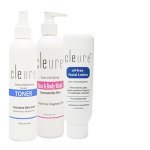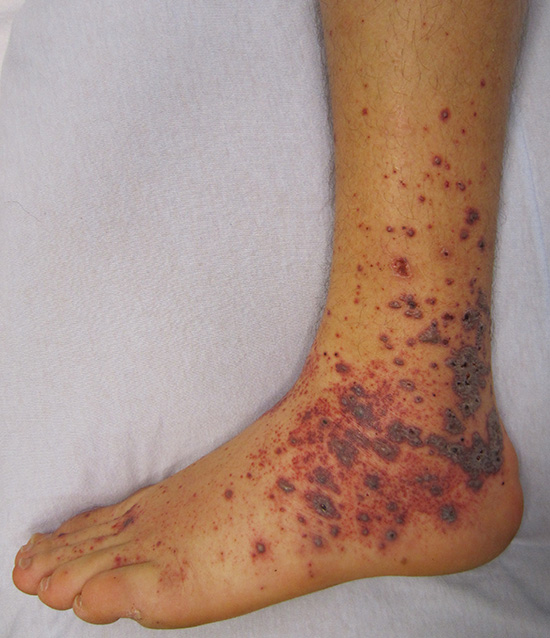Hypoallergenic Shampoo
Why Some Hypoallergenic Hair Care Products
Cause Allergic Reactions
The right hypoallergenic shampoo will minimize allergic reactions AND also make your hair clean, soft and shiny, but not all hypoallergenic hair care products are safe for people with allergies and sensitivities.
Yes, it is a shame to say that there is no industry wide standard for hypoallergenic products. That is why those of us with sensitive skin can benefit from educating ourselves and learning what kinds of substances our bodies do not tolerate.
That way we can take care of our bodies and stop using products that cause irritation!
It took me four long years to find a safe sensitive skin shampoo and conditioner that not only didn't make me sick, but that also made my hair look nice! I hope I can save you some of the trouble I went through.
Hypoallergenic Hair Care Products That
Cause Allergies
Unfortunately, some sensitive skin shampoos simply remove the fragrance and artificial colorants and call themselves a hypoallergenic shampoo.
This may work for some people with allergies, but if you have hypersensitive skin or are allergic to everything, then this may not be enough to prevent a terrible skin reaction.
Many hypoallergenic shampoos contain ingredients which have been shown in laboratory research to be strong irritants!
A little education will help you to avoid those hypoallergenic shampoos that are more irritating.
If you are able to take just few minutes to read through this page, you will know exactly how to find sensitive skin shampoos that will not cause skin reactions.
Common Allergy Producing Ingredients in Shampoos
One of the most common ingredients in most shampoos is Sodium Lauryl Sulfate or Sodium Laureth Sulfate, which are foaming agents also used in cosmetics and personal care products.
They are found in toothpastes, tooth whiteners, body washes, facial cleansers, mouthwashes, facial moisturizers, and cosmetic foundation.
Sodium Laureth Sulfate is found in hair color and bleaching products, exfoliants and scrubs, bubble baths, liquid hand soaps, mascara, dandruff and scalp treatments and conditioners.
Sodium Lauryl Sulfate and Sodium Laureth Sulfate are considered an irritant to both humans and animals according to the Cosmetic Ingredient Review. There is also evidence suggesting that they contribute to organ system toxicity, endocrine disruption and nervous system and brain toxicity.
In addition, Sodium Lauryl Sulfate been found as a contaminant in food and water sources, and causes toxicity in wildlife and the environment. Sodium Laureth sulfate may contain toxic contaminants of Ethylene Oxide or 1,4-Dioxane.
Yikes!!
I can't tell you how many times I've heard people say that when they stopped using their regular brand of toothpaste, their mouth rash went away. Or when they switched using their shampoo, their skin outbreaks cleared right up!
If you have sensitive skin or persistent rashes that seem to never go away, consider using a hypoallergenic shampoo that does not contain Sodium Lauryl Sulfate or Sodium Laureth Sulfate.
Reading Your Shampoo Label
You will need to read the label of your hypoallergenic shampoo in order to find out whether it contains Sodium Lauryl Sulfate or Sodium Laureth Sulfate.
Other names for Sodium Lauryl Sulfate include:Sodium Dodecyl Sulfate Sulfuric Acid Monododecyl Ester Sodium Salt Sulfuric Acid Monododecyl Ester Monododecyl Ester Sodium Salt Sulfuric Acid Sodium Dodecyl Sulphate Sulfuric Acid Monododecyl Ester Sodium SaltOther names for Sodium Laureth Sulfate include:
Dodecyl Sodium Sulfate Peg- (1-4) Lauryl Ether Sulfate Polyethylene Glycol (1-4) Lauryl Ether Sulfate Poly (Oxy-1,2-Ethanediyl) A -Sulfo-W (Dodecyloxy) Polyoxyethylene (1-4) Lauryl Ether Sulfate Sodium Peg Lauryl Ether Sulfate Sodium Polyoxyethylene Lauryl Ether Sulfate Sodium Polyoxyethylene Lauryl Sulfate Sodium Salt Peg- (1-4) Lauryl Ether Sulfate Sodium Salt Polyethylene Glycol (1-4) Lauryl Ether Sulfate Sodium Salt Poly (Oxy-1,2-Ethanediyl) A-Sulfo-W (Dodecyloxy)In addition, there are similar ingredients added to shampoos and personal care products which are equally or more irritating such as
Sodium Dicocoylethylenediamine Peg-15 Sulfate Sodium Laureth-40 Sulfate Sodium Coceth Sulfate/ Peg-40 Glyceryl Cocoate Lauryl Methacrylate/Sodium Methacrylate Crosspolymer Triethanolamine Lauryl Sulfate
Other Irritants in Your Shampoo
There are other ingredients in shampoos that can be irritating or cause allergic reactions to people with sensitive skin.
Fragrance is one of the top allergens in the world. Stop using products with added fragrance and you are well on your way to living a less allergic life!
Herbs and botanicals are natural substances, but some people with allergies are sensitive to them, especially people who are allergic to salicylates. In addition, products with natural ingredients require preservatives unless you make them fresh at home.
Rancid natural oils are another potential irritant for sensitive skin if you are using natural products. Products that are reaching their expiration date, or that are exposed to excess heat or moisture can develop a rancid smell that lets you know that you shouldn't put them on your skin.
Other potential irritants that may be in your shampoo include:
- Parabens such as methlyparaben, butlyparaben and propylparaben
- Propylene Glycol
- Petroleum or petroleum by-products
- Formaldehyde-based preservatives such as DMDM hydantoin, diazolidinyl urea, imidazolidinyl urea, and quaternium-15, 2-bromo-2-nitropropane-1,3-diol, and sodium hydroxylmethylglycinate. T
- Animal by products
- Phthalates
- Some forms of Alcohol
- Aluminum
- Mineral oil
- Triclosan
You can learn more about choosing safe, non irritating ingredients for your sensitive skin shampoo here at our Safe Cosmetics Guide
Finding a Good Quality Hypoallergenic Shampoo
Ah, I found this quite a difficult process. I really went through the wringer trying to find something that wouldn't cause my skin to break out, that also made my hair look good!
I tried almost everything at the health food store.
One thing about finding a good hypoallergenic shampoo and conditioner is that without the foaming agents like Sodium Lauryl Sulfate, you can't always tell if your hair is getting clean.
The products without fragrance and without Sodium Lauryl Sulfate didn't clean my hair. My blonde hair turned brown and greasy and flat. Ugh!
I tried products without fragrance but WITH Sodium Lauryl Sulfate which looked OK on my hair but caused my skin to break out.
Sometimes I would try a shampoo that worked OK, but the conditioner made my hair greasy!
It got to be like an unhappy hobby, shopping for a new fragrance free shampoo.
Before and After Pictures of my Hair
One day I decided to look for a fragrance free volumizing shampoo , hoping that this would make my hair look a little fuller.
That's when I stumbled upon a little known hypoallergenic product line that manufactures safe botanical free and salicylate free products.
I was so discouraged by the time I found them that I was ready to give up, but I thought, hey, let me try one more time. So I went ahead and bought yet another bottle of shampoo and conditioner.
I wasn't prepared to be pleasantly surprised! Lo and behold, both their Volumizing Shampoo and Replenishing Conditioner ended up working fabulously for my hair! You can see the difference here in my before and after pictures.
Before Cleure ----- After Cleure
Later on I learned that their products also contain no salicylates, which greatly improves the chance that the products will be gentle and safe for even hyper sensitive skin.
I've been using the Cleure sensitive skin shampoo and conditioner now since January of 2008 and so far I've never had an allergic reaction to it or to any of the company's other products.
Hypoallergenic Shampoo Update for 2013
More and more companies are realizing that SLS and other ingredients aren't great for our health, and so there are more and more SLS free shampoos and fragrance free shampoos out there on the market. I'm very glad that there are more options available now!
I have continued to try different brands of hypoallergenic shampoo and fragrance free shampoo. On several occasions I ran out and had to use the health food store brands of fragrance free shampoo.
I've also tried some very nice 100% organic and natural shampoos.
None of them worked as well for my hair! It was back to the dry, dull thin look! OR with the nice natural shampoos, I'd get a greasy look from the conditioners.
The Cleure shampoo still works great for me and has gotten even better over the years. Now even my husband is a fan, he says it works the best of all the shampoos he has tried.
MONEY SAVING TIP - I've found that I still get great results by simply diluting the shampoo by half. It works just as well and lasts twice as long!
Where to Buy
Cleure shampoo is available online and can be shipped to most countries. Click here to purchase.
More Information on Hypoallergenic Hair and Skin Care
I hope we have been able to help you out a little to learn about finding good hypoallergenic hair care products.
If you'd like to know more about how to read product labels to discover the hidden ingredients in your shampoos and cosmetics, please request our free ebook which will show you all the ins and outs of how to avoid putting irritating and allergy producing ingredients onto your sensitive skin.
Thank you for visiting, and please let me know how I can continue to be of support to you!
Home > Hypoallergenic Products > Hypoallergenic Shampoo
Home > Hair Dye Allergies > Hypoallergenic Shampoo









New! Comments
Share your thoughts about what you just read! Leave me a comment in the box below.